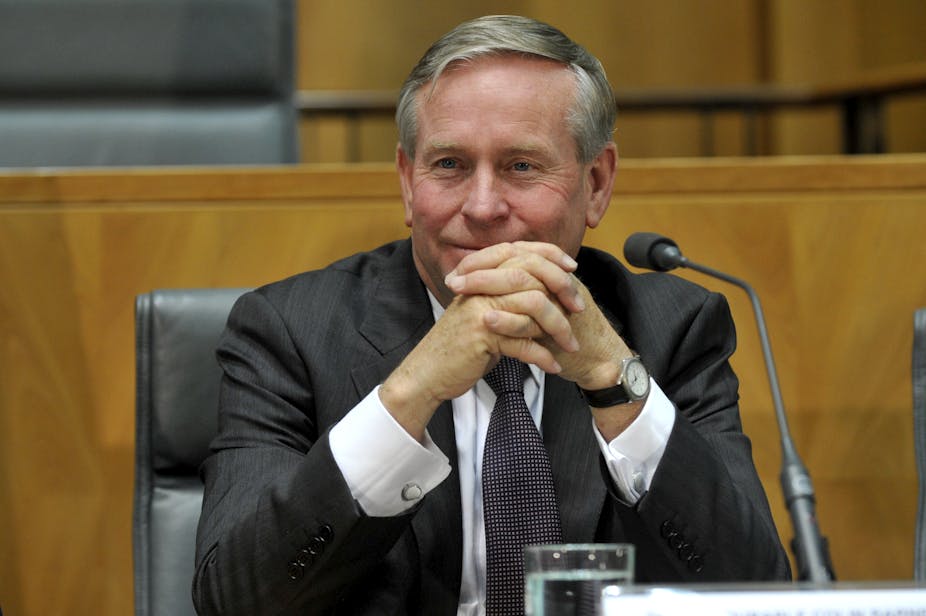As Western Australian’s prepare to head to the polls this Saturday, where do the parties stand ahead of the state election?
Opinion polls published since January have the Liberal and National alliance in Western Australia polling between 56% and 59% of the two party preferred vote, suggesting a thumping win for Colin Barnett’s government on March 9.
Newspoll showed 59% of those polled thought the alliance would win, compared to just 25% who predicted a Labor victory. Even the bookmakers have the Liberals at amazing short odds for a two-horse race, with Barnett at $1.01 compared to Labor’s Mark McGowan at $13.00.
So, is the Western Australian election all over bar the voting?
The Liberals have the past and present in their favour. Only two first-term governments have lost an election in WA since the First World War – in 1933 and 1974. The state’s resource-based economy is booming with high rates of economic growth, jobs and incomes.
The federal government is a major drag on state Labor. Federal Labor won barely 31% of the primary vote in Western Australia in 2010 and things are unlikely to have improved with the carbon tax issue and heated arguments over the distribution of GST revenues. Federal ministers (including the Prime Minister) have reportedly been told to stay out of WA during the election campaign, and McGowan has publicly stated his opposition to the carbon tax.
Despite this, there are still a few things worth noting.
The first is basic electoral arithmetic. It is often forgotten that Barnett leads a minority government, with only 24 Liberal members in a 59 seat parliament, and governs with the support of Nationals and independents. After an electoral redistribution, Labor holds a notional 27 seats and is expected to regain the seat of Fremantle lost to the Greens in a by-election. In theory, if Labor can hold its existing seats and win just two seats off the Liberals or Nationals, it could win government.
Labor has given itself a chance by choosing well-respected local candidates in at least three Liberal-held seats: Mount Lawley (where Labor needs a 1.7% swing), where popular former member Bob Kucera – who was controversially dumped by Premier Alan Carpenter at the 2008 election – is re-contesting; Riverton (2.0%), where Hannah Beazley, daughter of former federal Labor leader Kim Beazley, is the Labor candidate; and Swan Hills (3.5%), where Ian Radisich, the brother of the late Labor MP for the electorate, is running in a seat where the Liberal MP is under pressure over an unmet promise from the last election to build a railway line to his electorate.
But, even if Labor can win two of these, its chances of retaining all its other seats appear slim, especially in regional Western Australia where four Labor seats are under pressure from the Nationals, buoyed by the popularity of their Royalties for Regions program. In metropolitan Perth, there are at least four other seats vulnerable to a Liberal swing of less than 3.5%.
Second, the leadership contest has been a contrast of styles, with Barnett channelling former Premier Sir Charles Court with his “big picture” visions for the state compared to McGowan’s image of suburban ordinariness.
Barnett has been vulnerable to accusations of arrogance and of running a one-man show since his former Treasurer, Christian Porter, resigned to contest the next federal election. Barnett prides himself on his decisiveness and no-nonsense style, but this has on occasions got him into trouble with ill-disciplined media comments and tetchiness in the heat of an election campaign. By contrast, Labor leader Mark McGowan has generally performed well and his rating as preferred Premier has risen to be only four points behind Barnett.
Thirdly, Labor has made the running in the election campaign through Metronet, its rail plan aimed at linking Perth’s middle and outer suburbs and the airport. With the population growing rapidly, congestion has become a major concern and Labor is hoping to capitalise on its reputation as the party which built the Joondalup and Mandurah rail lines when in government.
The plan has the added benefit for Labor of running through several marginal electorates and of putting the Treasurer and Transport Minister, Troy Buswell, in the media spotlight. Buswell has been plagued by personal problems and polls have indicated that he may pull down the Liberal vote.
Buswell and the government have retaliated by attacking Labor’s Metronet costings and questioning the location of their proposed airport station. A Treasury assessment released on Friday came in at $5.2 billion over eight years – above Labor’s estimated $3.8 billion but below the government’s estimate of $6.4 billion.
The waters were muddied further when Buswell conceded that the Liberals’ three key transport initiatives will require the federal government to provide at least half the funds, whereas Labor has itemised specific cost savings by making (controversial) decisions to defer or amend other capital works to help pay for Metronet.
With Labor’s transport showpiece under fire, the electoral tide appears to be coming in for Barnett . Factors such as federal Labor’s unpopularity, a booming state economy, and being a first-term government, appear likely to outweigh any tactical victories Labor and McGowan may have won in the leadership stakes and election campaign, unless something unforeseen happens in the next few days.

